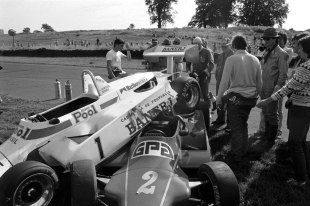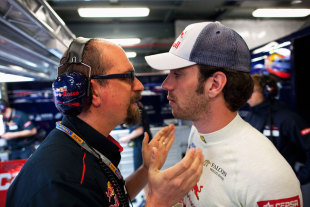
- Drivers:
- Martin Brundle
- |
- Richie Ginther
- |
- Ludovico Scarfiotti
- |
- Ayrton Senna
- |
- Jean-Éric Vergne
- |
- Bill Vukovich
I remember a great battle between Ayrton Senna and Martin Brundle for the British Formula Three championship. When was this, and how many of those champions went on to success in F1? asked George Sponder
That struggle between Brundle and Senna, which went down to the last race of a long season, was in 1983. Senna emerged victorious - just - and started his F1 career in a Toleman the following year. "Senna was so strong in the head and on the racetrack. I think he won the first nine races," Brundle told The Sun recently. "I followed him home in eight of those nine and I really struggled to cope with his sheer speed and determination. Ayrton had a sixth sense for where the grip was. He just somehow knew - he had the feel of the tarmac, the car, the conditions - where he could go a little bit faster. You could see it in qualifying in a Formula One car and I saw it in Formula Three where he could be at one with the car, the car just sliding on the absolute limit of adhesion." Apart from Senna, the other future F1 world champions who have won versions of the British F3 title (which wasn't consolidated into a single championship until 1979) were Jim Clark (1960), Jackie Stewart (1964), Nelson Piquet (1978) and Mika Hakkinen (1990). The 2009 and 2010 champions, Daniel Ricciardo and Jean-Eric Vergne, are now team-mates at Toro Rosso.
Who was the last Italian to win the Italian GP? asked Chris McNaughton
Rather surprisingly, it's as long ago as 1966 that an Italian driver last won the Italian Grand Prix. That year it was won by Ludovico Scarfiotti - in a Ferrari, of course. It was the only victory of Scarfiotti's brief F1 career: he only started ten GPs, although he had won Le Mans in 1963. He was killed in a hill-climbing event in Germany in 1968. Even before that only two other Italians had ever won a world championship GP at Monza: Nino Farina in 1950, and Alberto Ascari in 1951 and 1952. It won't happen this year, either, unless something odd happens: for the first time, there isn't an Italian driver among the regular F1 starters.
When did they stop the rather odd system of discounting some results in deciding the world championship? asked Trevor Marley
I've never quite understood why, for years, the world championship was complicated by the system you're talking about, in which only a certain number of a driver's results would count towards the world championship. I imagine it was done to put a premium on race wins, rather then safe second or third places - a concept which Bernie Ecclestone has been keen to rekindle in recent years. For the first four seasons of the official world championship (1950-53) only a driver's best four results counted towards the title (there were usually only seven or eight races back then). Between 1954 and 1966 either the best five or six results were counted ... and then things got even more complicated: between 1967 and 1978 the championship was split into two halves, and a driver could discard his worst result from each half. In 1979 he could count the best four results from each half of the year, and in 1980 his top five. Then in 1981 the halves were ignored and a driver could count his best 11 results of the season - and then, in 1991, the current system was adopted in which all points gained counted towards the title. Despite all this, there have only been two seasons when a different champion would have been crowned had all the results and points been counted - in 1964, when Graham Hill collected 41 points to John Surtees's 40, but had to discard two so finished one behind; and in 1988, when Alain Prost ended up with 104 points to Ayrton Senna's 94, but had to discard 18 points, whereas Senna only lost four: he ended up winning by 90 points to Prost's 87 when the best 11 results were counted.

Three of this year's drivers are currently 22 - Sergio Perez, Charles Pic and Daniel Ricciardo - but there's one who's still only 21: Toro Rosso's French newcomer Jean-Eric Vergne, who doesn't celebrate his 22nd birthday until April 25, a few days after the Bahrain GP. The oldest man on the grid in 2012 is, of course, 43-year-old Michael Schumacher, while HRT's Pedro de la Rosa is 41.
Which Grand Prix winner was born in Hollywood? asked Stephen Collins
This was the diminutive American driver Richie Ginther, who won the Mexican GP in 1965, becoming the first man to win a world championship race in a Honda. That was the only GP win for Ginther, who got into racing through his friendship with the 1961 world champion Phil Hill, but he did finish second on no fewer than eight occasions, the first two in a Ferrari and the other six as Graham Hill's BRM team-mate. Ginther finished third in the world championship in 1963, behind Hill and the runaway winner Jim Clark.
Who was the first driver to be killed during a world championship race? asked Colin Maguire
This solemn statistic has several answers really. The first man to die at the wheel during a race for the F1 world championship was the American Bill Vukovich, during the 1955 Indianapolis 500 (which counted towards the F1 title from 1950 to 1960). He had won the Indy 500 the previous two years, and was aiming for an unprecedented hat-trick when he was involved in an accident on the 57th lap while in the lead. Another American, Chet Miller, had been killed in practice at Indianapolis in 1953. The first driver to die during a genuine Grand Prix weekend was Onofre Marimon, an Argentinian, who was killed in practice for the German GP at the Nurburgring in 1954. And the first man to perish during a world championship race itself was the Italian Luigi Musso, whose Ferrari crashed during the 1958 French GP on the high-speed circuit at Reims. Two further drivers - the Britons Peter Collins and Stuart Lewis-Evans - died in separate crashes in Grands Prix later that same, sad year.
If you want to ask Steven a question, use our feedback form. The most interesting questions will be answered here every other Friday. His long-running Ask Steven column on Cricinfo remains one of that site's most popular features
© ESPN Sports Media Ltd.
 If you want to ask Steven a question, use our feedback form. The most interesting questions will be answered here every other Friday. His long-running Ask Steven column on Cricinfo remains one of that site's most popular features Ask Steven features a number of experts, headed by Steven Lynch, who answer your questions across Formula One as well as a variety of other sports
If you want to ask Steven a question, use our feedback form. The most interesting questions will be answered here every other Friday. His long-running Ask Steven column on Cricinfo remains one of that site's most popular features Ask Steven features a number of experts, headed by Steven Lynch, who answer your questions across Formula One as well as a variety of other sports

